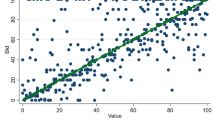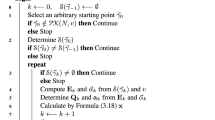Abstract
Discontinuous games, such as auctions, may require special tie-breaking rules to guarantee equilibrium existence. The best results available ensure equilibrium existence only in mixed strategy with endogenously defined tie-breaking rules and communication of private information. We show that an all-pay auction tie-breaking rule is sufficient for the existence of pure strategy equilibrium in a class of auctions. The rule is explicitly defined and does not require communication of private information. We also characterize when special tie-breaking rules are really needed.
Similar content being viewed by others
References
Araujo, A., de Castro, L.: Pure strategy equilibria of single and double auctions with interdependent values. Gam Econ Behav (forthcoming) (2007)
Araujo, A., Moreira, H.: Adverse selection problems without the Spence-Mirrlees condition, working paper, IMPA (2000)
Araujo, A., Moreira, H.: Non-monotone insurance contracts and their empirical consequences, working paper, IMPA (2003)
Athey S., Levin J. (2001) Information and competition in U.S. Forest service timber auctions. J Polit Econ 109: 375–417
de Castro, L.: Affiliation, equilibrium existence and the revenue ranking of auctions, working paper 07-49 (25), Universidad Carlos III de Madrid, available at http://www.impa.br/~luciano/affiliation.pdf (2007)
de Frutos M.A., Pechlivanos L. (2006) Second-price common-value auctions under multidimensional uncertainty. Gam Econ Behav 55: 43–71
Dasgupta P., Maskin E. (2000) Efficient auctions. Q J Econ 115: 341–388
Ewerhart C., Fieseler K. (2003) Procurement auctions and unit-price contracts. Rand J Econ 34: 569–581
Fullerton R.L., McAfee R.P. (1999) Auctioning entry in tournaments. J Polit Econ 107: 573–605
Jackson M.O., Simon L.K., Swinkels J.M., Zame W.R. (2002) Communication and equilibrium in discontinuous games of incomplete information. Econometrica 70: 1711–1741
Jackson M.O., Simon L.K., Swinkels J.M., Zame W.R. (2004) Corrigendum to communication and equilibrium in discontinuous games of incomplete information. Econometrica 72: 1927–1929
Jehiel P., Moldovanu B., Stacchetti E. (1996) How (not) to sell nuclear weapons. Amer Econ Rev 86: 814–829
Kallenberg O. (2002) Foundations of Modern Probability, Springer Series in statistics. Heidelberg: Springer
Lehmann E.L. (1959) Testing Statistical Hypotheses, Wiley Series in Probability and Mathematical Statistics. Wiley, New York
Maskin E., Riley J. (1984) Optimal auctions with risk averse buyers. Econometrica 52: 1473–1518
Maskin E., Riley J. (2000) Equilibrium in sealed high bid auctions. Rev Econ Stud 67: 439–454
Mertens J.F., Zamir S. (1985) Formulation of Bayesian analysis for games with incomplete information. Int J Game Theory 14: 1–29
Milgrom P.R., Weber R.J. (1982) A theory of auctions and competitive bidding. Econometrica 50: 1089–1122
Monteiro, P.: First-price auction symmetric equilibria with a general distribution, working paper EPGE n. 568 (2004)
Reny P., Zamir S. (2004) On the existence of pure strategy monotone equilibria in asymmetric first-price auctions. Econometrica 72: 1105–1125
Simon L.K., Zame W.R. (1990) Discontinuous games and endogenous sharing rules. Econometrica 58: 861–872
Taylor C. (1995) Digging for golden carrots: an analysis of research tournaments. Am Econ Rev 85: 872–890
Zheng C.Z. (2001) High bids and broke winners. J Econ Theory 100: 129–171
Author information
Authors and Affiliations
Corresponding author
Rights and permissions
About this article
Cite this article
Araujo, A., de Castro, L.I. & Moreira, H. Non-monotoniticies and the all-pay auction tie-breaking rule. Economic Theory 35, 407–440 (2008). https://doi.org/10.1007/s00199-007-0249-0
Received:
Revised:
Published:
Issue Date:
DOI: https://doi.org/10.1007/s00199-007-0249-0
Keywords
- Auctions
- Pure strategy equilibria
- Non-monotonic bidding functions
- Tie-breaking rules
- Necessary and sufficient conditions for equilibrium
- Multidimensional types




